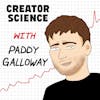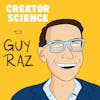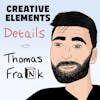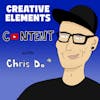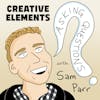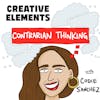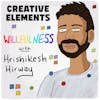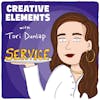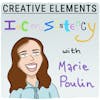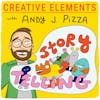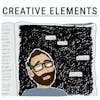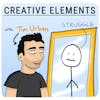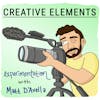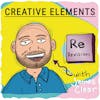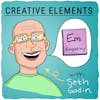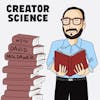
#163: David Moldawer — Diving deep into book publishing with an industry insider
Play EpisodeBreaking down who should write a book, when to write it, and how publishing works.
David Moldawer has spent more than a decade in book publishing, acquiring and editing best selling books for Penguin, Saint Martin's Press, McGraw Hill, and Amazon Publishing New York. Those books were predominantly nonfiction in the areas of business, technology, health, and memoir.
Today, David is an independent writer and editor with his business Bookitect. David helps authors create bulletproof book proposals.
In this episode, you’ll learn:
- Who should write a book
- When they should write a book
- Why they should write a book
- What they should write a book about
- And how the publishing industry works - from royalties to advances, the auction process, hybrid publishing, self publishing, and more
Full transcript and show notes
David's Website / LinkedIn / Newsletter / Instagram
***
CONNECT
🙏 Make a guest or mailbag request
📝 Check out our curated Playlists
***
SPONSORS
💼 View all sponsors and offers
***
SAY THANKS
💜 Leave a review on Apple Podcasts
Learn more about your ad choices. Visit megaphone.fm/adchoices
Jay Clouse [00:00:14]:
Hello, my friend. Welcome back to another episode of creator science. In this episode, we are continuing our exploration into the world of Book Publishing. My guest today is David Maldauer. David has spent more than a decade in Book Publishing, Acquiring and editing best selling books for Penguin, Saint Martin's Press, McGraw Hill, and Amazon Publishing, New York. Those books were predominantly nonfiction in the areas of business, technology, health, and memoir. Today, David is an independent writer and editor with his business bookitect. You can learn more at bookitect.com. David helps authors create bulletproof book proposals. David was recommended to me by Brennan Dunn, who worked with him on his book proposal, as well as Lisa Dimona, who serves as the literary agent for James Clear, Tiago Forte, Noah Kagan, and a lot of other guests on this show. David is a wealth of knowledge on the publishing industry, In fact, can you guess what category of books makes up the vast majority of book sales?
David Moldawer [00:01:10]:
Self published $1 romance novels and those readers read 7 a week. That's the reality. If you're gonna talk about books that are actually read.
Jay Clouse [00:01:19]:
That's great. --
David Moldawer [00:01:19]:
crazy and depressing.
Jay Clouse [00:01:23]:
So suffice it to say this is an interesting and entertaining episode. It's in-depth, and I hope you listen all the way through to the end. We cover who should write a book, when they should write a book, why they should write a book, what they should write a book about, and how the publishing industry works. from royalties to advances, the auction process, hybrid publishing, self publishing, and more. If you enjoyed my recent interview with Tory Dunlap about her experience getting a book published, you will certainly enjoy this one. This goes beyond one author's experience and really gives a bird's eye view at the entire publishing industry. And if you enjoy this episode, please let me know. Tag me on Instagram or Twitter at jklaus, but now let's talk with David. Maybe the easiest question to start with? Well, it sounds easy, but it might be deceptively complicated. Is Who should write a book?
David Moldawer [00:02:16]:
Well, that is that is an interesting question. So one, I think just to start the conversation, because the this is gonna come up over and over is that the consumer goes into a bookstore and sees all these identical looking objects, mostly identical, mostly 6 inches by 9 inches, of course, there's exceptions. But You know, we think of these things as the same thing, the same product, a fungible product. You know, it's a book. A book is a book, but it's actually, that is not the case. for example, most of the work that I do as an editor and as a writer has been in business books, self help books, things like that. And the entire operation, everything about it is so completely and fundamentally different from something like a novel. And even within novels, you have genres, you have the romance novels, you have the science fiction novels, you have literary fiction, all these different worlds. And we get there's a lot of confusion for for would be authors and and even people in the industry when we mix these things up and we think that something that applies to one of those categories applies to another one of those categories when it doesn't. So I find it helpful to just think of them as just completely different products like a grocery store. Right? There's orange juice, and there's tomato sauce, but but they've got a lot going on. That's very different. Orange juice has gotta be refrigerated tomato sauces that it can. You can't open. So who should write a book? if you're a fantastic storyteller, you should write fiction. That's an easy. That's an easy one. If you can tell a great story, you need literally nothing else. to to succeed as a storyteller. When you talk about other categories like a business book, for example, it gets a lot more complicated because you're gonna write a book that tells somebody how to do well. In business books, that's a category that we use that it's probably a little outdated at this point because it encompasses personal development, you know, a book that tells you how to improve your habits, you know, for example, self help is also sort of, feels dated to me. but but we lump all of those kinds of books under what we call prescriptive nonfiction. There's other kinds of business books as well. You could read the, you know, how we created them Apple Macintosh. You know, that's not prescriptive. But a book that tells you how to do something better, that category, you have to be good at that thing. Yes. To write that book. And if you're gonna write a book that says, how to make a $1,000,000 as an entrepreneur, but you've never founded a business, That's there's a disconnect there. And by the way, that sounds silly, but it's actually quite common. People will come and and wanna write a book about how to be successful, but they're not successful, but they've read a lot of books about how to be successful. I've had that conversation. So and I've told them, no. Go be successful. You know what I mean? So the the accomplishment aspect of it, it's not as simple as platform. Platform's part of it, being having an audience that that's already coming to you and saying, Hey. How did you become so successful? That's a great sign when people were like, when should I write a book? Whether or not, you know, because you said, whether you should write a book, but really it's when? When should I write a book? when people start asking you is a great sign. If you have anyone on a your your podcast, like, you have an audience, newsletter, and they're saying, put this in a book. Like, I want this all in one place. I want your wisdom. I want this method. Then then you're ready to write a book. If no one's asking you for a book, it's a good sign that you're probably not in the place to write that book yet.
Jay Clouse [00:05:21]:
You're jumping ahead of me. I have a literal who, what, when, where, why, and how framework for this interview, and you're jumping to when. That's my third question. Let's Let's let's revisit this grocery store idea because I like this as as a metaphor. Let's assume that nonfiction business books are orange juice in your example. How much of this grocery store is dedicated to orange juice versus other products?
David Moldawer [00:05:46]:
It depends on which chain you're going into. So to give you a sense of perspective, you know, Barnes And Noble, of course, they wanna sell books, but they also and increasingly, I was actually just listening to their new CEO, James Daunt, at an event, talking about this. You know, they they are trying to get the people in this story, you know, in that old fashioned sense of a book seller, to get the people who work in the Barnes And Noble to place book that are interesting to them that I think the local community will be interested in. So there's a human curation element that isn't necessarily tied to sales. that isn't necessarily as simple as, you know, what is going to sell the most copies. Let's just have a 1000 copies on every shelf of the latest Stephen King novel and everything else can just be in the warehouse. do you know what I mean? Because it can get to that point when you're dealing with limited space. If you were really going to just stock whatever's going to sell You could come down to 7 books, which doesn't make for a very rewarding bookstore experience. Amazon I worked at Amazon for a few years, and it was made clear to me as an editor. And and it was made clear to me that, despite the fact that the oxygen in the room is taken up in terms of the media and sort of popular attention is taken up by things like literary fiction or a big weighty history of the Supreme Court, things like that. from Amazon's perspective, if this is all books that have ever been published, then then the actual number of books sold, like, this is romance novels.
Jay Clouse [00:07:09]:
Yeah. For people who are listening, Davis Ann moved very little.
David Moldawer [00:07:13]:
Yeah. And that the the sliver over here that gets all the attention. It's a bit like, you know, succession, the the TV show, like, that every newspaper in the world, every magazine, everyone's talking about succession, but if you look at its numbers, it's this tiny little sliver of audience. And, you know, there are these sort of big broad sitcoms that no one talks about that have fifty million times as many viewers. So, you know, in that sense, the the grocery store can look very different in terms of, like, what's actually selling. The grocery store is filled with romance novels. Self published $1 romance novels and those readers read 7 a week. That's the reality. If you're gonna talk about books that are actually read. That's great. -- crazy and depressing. unless you lie, I mean, enjoy them.
Jay Clouse [00:07:56]:
Are you telling me that I'm in the wrong business and that I should be writing romance novels or Is there a different way to think about this?
David Moldawer [00:08:04]:
Absolutely different way. so I've been I've been doing this for a long time. I was an editor for about a decade. And now I've been doing this writing thing for approaching a decade. And in both cases in this area, mostly in this area. And I've had authors, you know, as an editor, you wu an author. You you convince them, and, of course, there's often an auction where everyone has to outbid each other, but ultimately, it's a personality fit. You're kinda like, I'm gonna help you succeed as an author. And they come to you and they publish the book, and it's several, you know, sometimes a couple of years, this relationship, and then the book is sold. And years later, you run into them. And I would have this feeling because most books don't succeed commercially. most books do not become big best selling books. And even even a single author, you can think of an author and say, oh, so and so. He's a best selling author. That may be true. But if you actually looked at all of their books and not just the one you know them from, you'll see that they've had plenty of failures in their resume. If you're gonna think about failure as not selling more than a few thousand copies. And so that's the case for most books most of the time. And I would run into these people, and I'd feel a little bit embarrassed. Barrett, like, awkward. Like, oh, you know, we are you mad at me? Are you mad at me that your book, you know, sold
Jay Clouse [00:09:15]:
6000
David Moldawer [00:09:16]:
copies? And, in every case, in every case when I broached that topic, the reaction I got was always the opposite. The reaction was always tremendous, tremendous satisfaction. that they that they went through. And it's not an easy process. It's not an easy process to write a book and publish a book. And, and you would think, oh, they only sold x number of copies, but the professional impact of a book is really hard to quantify, but very clear to the authors. They know why they're doing it. and even the office who complained the most loudly about the publisher failed me and the industry is changing. Oh, isn't that funny? They have another book lined up. They keep doing it. So they're getting something out of this, and it's not as simple as the revenue of the book, you know, especially in this category, you know, if you're an expert on something, having a book is is absolutely essential for for sort of establishing your credibility. You know, you that expression, you wrote the book on it. That that's quite real. and, it can translate in all kinds of ways, you know, public speaking. If you're any sort of consultant or speaker or trainer, you know, those things are amplified. in ways that you you can't necessarily trace. Sometimes it's just one person who read your book that changed your life, but I've heard that story way too many times. And often it's far more than one person who who that that new connection leads to these other opportunities, and it just creates the snowball of, possibilities. that would never have happened without the book, even if the book only reached a small audience.
Jay Clouse [00:10:43]:
You used a phrase a second ago, which was commercial success. In your mind, what is commercial success?
David Moldawer [00:10:50]:
Well, the the the way it works for those of the audience who don't know anything about the book industry, typically. And and this is this is changing. So there's a traditional, we call it traditional book publisher. And that's how most books have been most books that you would see in a bookstore have been published up until maybe 10 years ago most of the time. traditional book publisher. So if you think of Simon and Shuster, right, which is a big company, but it has smaller companies within it that each have kind of a brand. So you look on the side of the book, you see the telephone, which is like this little icon, like this is a Simon and schuster book. They pay you in advance against your royalties. So they will say, we think we can sell, you know, x number of copies of your book. and you earn this amount for each book that we sell, which is determined by your contract, and therefore, you're gonna this you're gonna make x amount of money, right, or we feel confident that you can make this amount of money on the book. But but but in, you know, in the case with most authors, you gotta live as you write the book. So it's kind of like a venture capital deal. We're gonna give you the money now, and they can't have it back, by the way, even if your book doesn't do well. So they're gambling on you. They're saying we're gonna give you Right. We're gonna give you a $1,000,000 advance. That doesn't happen often. We're gonna give you a $1,000,000 advance because we feel confident that at $3 a hardcover in this much in ebook and this much in paperback that you are going to earn at least that much on your end, and we're gonna give it to you you know, at this stage, and then it's going to earn out. And you won't get any more money from us until it earns out. Meaning, you've earned that much in terms of your royalties and anything beyond that, you earn. additionally. So commercial successes is earning out. And the fact is even then that publishers have structured it in such a way that your pub your book could not earn out and they can still make a profit. So there's still a point where where you haven't earned out your advance you still the publisher still is owed money from you technically, although they can't recoup it at all when they're still in in the black on that book. So, that's commercial success because the publisher will wanna do another one. If John Wick Four succeeds, they're gonna wanna do John Wick Five, even if they have to guess somebody else in it. You see what I'm saying? So, commercial success if they wanna do another one. So you can have a book, and this just happens very often, where the agent creates this crazy auction, and all the publishers go overboard, and they and someone ends up buying the book for
Jay Clouse [00:13:11]:
$780,000
David Moldawer [00:13:13]:
advance. And the book sells 15,000 copies in hardcover, which is which is great. That that's a successful book. It's hard. If that's that much in hardcover, way more it's gonna be in e books But it's possible the book doesn't earn out and the publisher doesn't make money, and they're not gonna come back to you. Even though you sold a lot of books, there's a kind of you've kind of tarnished that relationship, and it can even tarnish your opportunities with other publishers because there's that sense that you didn't deliver on your promise. Even though, again, the book sold a lot of copies. So, it's really about the expectations versus reality. If you had a small advance and you outperform it, great. Like, when you see an indie film, tiny little budget, and it did really made $50,000,000. Like, everyone, that's a big deal, even though that same amount for Mission Impossible 7 would have been considered colossal disaster.
Jay Clouse [00:14:00]:
How could somebody how could the publisher possibly be in the black if you haven't paid back your advance?
David Moldawer [00:14:05]:
Because the public the royalty only represents a portion of the amount of money that the publisher gets on the book sale. On a hardcover book, let's say it's $25 or $26 around. So, like, $13 it's like 50.50 to the book seller in the the bookstore. So those the the company's getting $13. Let's say these are made up numbers. So so Penguin random house gets $13 back from Burns and Noble when that copy, sells, not really, but, like, for simplicity's sake, And then of that $3 is earmarked for the author. Any other 10 is for making the book, which is $4 etcetera, etcetera. So the point is is that you can get to the point where you've made back, even if the advance doesn't fully earn out, you you've still made money on the book and you'd be willing to do another.
Jay Clouse [00:14:51]:
An easy conclusion to come to based on what you just said would be that if I have means of earning income where the advanced itself isn't what I need to subsist while writing this book. I would take a lower advance than necessary so that It's more likely to earn out. But I would guess that there's also some tension there of if a publisher is paying a lower advance for a book, they might Take it less seriously than other books.
David Moldawer [00:15:21]:
Yes. And that is exactly correct. And I would say that if I was an agent, which I'm not, But if I was an agent and I had a client who had the choice between a big advance with a big publisher, but maybe, smaller advance with an indie publisher, In that situation, I might say go with the indie with a smaller advance because you get that advantage that you're more likely to earn out and also for an indie publisher, the smaller advance is just as much skin in the game as it is as a larger advance is for the bigger publisher. So it's really about it's about skin in the game for the publisher. If it's going to hurt them, if it's really gonna hurt that imprint, and it can. You know, once you get into those mid high 6 figure advances, that's gonna hurt if the book doesn't perform and they're heavily invested. Whereas if it's a young editor, I did a lot of these in my career as a young editor, you're hungry, you're trying to you're taking big, you know, these little swings, they'll give you $20,000. They'll give you $30,000 for a book. If that book doesn't work, they don't care. You can take 10 little bets for the for the price of one big bet and probably, you know, one of those will work out of those ten. there's a there's a strategy to that spaghetti at the wall approach. But again, they're not going to they're not gonna go out of their way. And you'll see, in fact, It depends on the category, not so much in business books, but things like novels where you would think like the the people think cream rises to the top. with with books and it's not really the case. And I've seen many times where a book was great, but didn't work. And then somebody in the publishing house said, I'm not content with this. We put it out there. It was on shelves. No one read it, but I'm going to go beyond. I'm going to reach out to Walmart and we're gonna do a promotion because it's like perfect for the Walmart shopper. And then the book catches and snowballs. and and not because of quality, not because somebody read it, or at least not externally, but because someone in the house went the extra mile, And and going the extra mile can look a lot of different ways, but it's a pain in the butt. And if you work at a publisher, you cannot go the extra mile for everything. You just can't. You know, it's a it's a lot. It's a lot of work and you have to choose. And which one are they going to choose? Most of the time, it's the one that that had the big advance. They're gonna go beyond, you know, to get that to work. So in that sense, it it usually pays to take that bigger number even if it does create pressure that you have to that it has to perform. After a
Jay Clouse [00:17:41]:
quick break, David and I talk about the 5 major traditional publishing houses. We talk about how deals break down between advances in royalties when you might want to take a larger advance or a smaller advance. We even talk about how a publisher can make a profit on a book if it doesn't pay out the advance. So stick around. We'll be right back. And now back to my conversation with David Maldauer. If I'm listening to this and I'm not too familiar with the traditional publishing houses. What are the the biggest players in the room? You got your penguin random house. You have Simon or who else did you put in that same category?
David Moldawer [00:18:16]:
You have Simon Chester, Penguin Random House, HasSheets, and, Harper Collins. That's the current state of the industry in terms of the big companies. And then there's some midsized companies like Norton And it's confusing because a lot of these companies are they're mergers of other companies. You know, when I worked at Penguin, it was Penguin. and penguin merged with random house. That was a big that was a big deal in the industry, you know, big 5, big 4. And and they kind of retain in a distinct character often. And so within Penguin, I worked for an imprint called Portfolio, which is a publisher of of business books. And so portfolio is its own little thing. And then next door is Viking. And there's a shared sales department between those two units, but everything else is separate, different editors, different publisher, And so you, you know, from the outside, all we know is the book that we read has an imprint. We call that an imprint. and the imprint is that little tiny company within a company that 50 years ago or 20 years ago was probably a separate company. Viking was a publisher. and it got swallowed up by, you know, a larger company. So that's what happens if they kinda merge and merge and merge, but they retain their brand because the brand is valuable among authors among agents, it means something to be published by viking, you know, so they hold on to that, even though it's part of this big conglomerate.
Jay Clouse [00:19:36]:
So an imprint is a company within a company, not a franchise that's, like, independently run by a third party. Oh,
David Moldawer [00:19:44]:
yeah. Yeah. Yeah. No. It's all this. It's all within the company, the publishing company. And, again, it can be confusing because there's random house. The company then there's actually an imprint at random house called random house, and that's when you see random house on the side of a book. And that's what they call that little random. Same for Simon and Shuster. They're books published by Simon and Shuster. Simon and Shuster Kids. There's all these, you know, brands within that big company, but the company itself is Simon and Shuster or Harper Collins or Hashette or penguin random house. But those that's something that really only someone in the industry would worry about. You know, your agent will say meet me at the random house building. We're gonna go there, but the actual imprint could be called something completely different and everyone at the imprint works just on those books.
Jay Clouse [00:20:26]:
Well, to orient us around, some economics a little bit, Wish list off the big 4 publishers. I would imagine they
David Moldawer [00:20:33]:
have -- And McMillan. I'm sorry. McMillan.
Jay Clouse [00:20:35]:
So, yeah, we got we got 5 there now. I would imagine there's, like, a certain band of expected advances where, like, you've listed off some of these mid to high 6 figure ranges for what the advance could go up to. What would typically be, like, the minimum advance one of those major publishers would be paying for?
David Moldawer [00:20:56]:
An advance can be it can be anything. because editors and especially publishers who are kind of like they that's it's their imprint. They have a lot of freedom. They have complete freedom, really, to to acquire, which is to to get the rights to publish any book. You know, if you go, so I've worked at McMillan, and there's a, publishing house in print within that called St. Martin's Press. That's where I worked. And at St. Martin's Press, you know, they do a lot of small books, you know, probably less now because of the economics of publishing being different. But if Someone there really, really, really loves a little book of poetry or a collection of short stories or something with very small commercial potential. However, there's a in the there's a a artistic merit or literary merit to the project, or maybe it's an author who is an author's author meaning a writer that other writers admire and having that writer on their list is very meaningful because other people who are who have more commercial potential say, oh my god, they published so and so. and you and I might not know who so and so is. But if that person admires this venerable writer who sells, you know, 2000 copies of every book that he publishes, but the two thousand people who read it are all, you know, other authors. So there's a there's a there's a science to it. you can get you might have a very, very small advance. you know, or no advance. Well, probably not no advance at all, but potentially a very small advance of, of maybe 10 or $20,000. And of course, there are midsize and smaller publishers Wylie and McGraw Hill and others, and they will do very small advances. And there are other kinds of arrangements, profit sharing deals, and other kinds of 3rd, they they they don't love to experiment, which is given other kinds of publishers and not an opening. but the reason they don't like to experiment with their deal is that agents tend to, hold on to those precedents. So for example, there's like a sort of a standard royalty structure 10% on the first 5000 hardcover copies, and then it goes to 12 a half percent. And you mess with that. And suddenly every every agent at CAA or William Morris is saying, well, what what happened to our special royalty structure? And you made that deal just to secure a a particular book, but now suddenly they expect it on multiple books. And so publishers tend to be very touchy They'll pay you more money on the advance, but they don't like to mess with the underlying mechanics of the deal. But ultimately, the the advance can be very small, or, again, the the sky's the limit up into the millions for for someone like a a president or someone of that stature.
Jay Clouse [00:23:26]:
So you're saying a lot of these deals After you cross a certain threshold of sales, your royalty as an author actually could increase. And therefore -- Oh, it
David Moldawer [00:23:34]:
does increase.
Jay Clouse [00:23:35]:
And then the agent would is would continue to get a static percentage of the royalties beyond that as well?
David Moldawer [00:23:42]:
Yeah. if you have an agent, which we can if you wanna talk about what that's all about, but if you do have a literary agent, they typically are are in 15% of everything that you get. So the publisher actually pays the agent directly and then they flow through to you 85% of what they receive, whatever it is. advances, royalties, if they sell foreign rights, if they make a big bulk sale, you know, if you're a business book author and you every employee at Google gets a copy of your book in a big bulk purchase. All that revenue goes to your agent and then they take their cut.
Jay Clouse [00:24:16]:
Interesting. So you don't have on your books expense to the agent because you're not getting the total and then giving them 15%, they're getting the total total and giving you 85.
David Moldawer [00:24:25]:
That's right.
Jay Clouse [00:24:26]:
Interesting. So we've talked a lot about, you know, there's there's this auction process. We haven't talked a lot about this, but, you know, there's there's an auction process for for books that seem to have some commercial viability and these, publishing houses will make their offers. How sophisticated is the modeling behind these publishers when they think, well, we think you're gonna sell this many copies, and therefore, this is the advance we'll give you.
David Moldawer [00:24:50]:
not very sophisticated. Well, I'll tell you what we do is or what I used to do is we would take sales figures from a comparable book. And so we're looking at and then often a book proposal will contain that. So you'll say this book is a book on losing weight, and here's 5 other recent successful diet books by somebody, again, comparable, somebody who sort of has as many followers on Instagram as I do or whatever. We look at those sales figures, which we get through the service called Nielsen BookScan, or if it's an internal book, if it's a book by the published by the publisher, you have complete data, And you look at that and you say, okay. Well, let's say, what if it did this well? What would the advance? What would be a smart advance? And we have a, an Excel file that calculates, you know, And, but the problem is is that you come up with a number that's realistic, then you get into an auction. And now it's a mind game, and we can talk all about auctions. In fact, I just did a panel on auctions at the US Book Show, which was fascinating. but you don't wanna lose. And if everyone else if you're doing a round robin situation, right, where it's like, we just spoke to Simon and Schuster, and they've gone up to a
Jay Clouse [00:25:57]:
$125,000
David Moldawer [00:25:59]:
What do they know that I don't know? I thought this was a $50,000 deal, and they're already at a 125. They must know something that I don't know. And I better go up. and I better go and fudge these numbers until it looks good. Cause that, you can do that. You could say, let's look. Let let's look at this other competitive title that did better. What if the audio did really well? We don't know. It could have done really well, then the audio book goes into it. So you you get auction fever, and it goes it can tend to go bad. It can tend to go bad. Sometimes you're right. Sometimes you go to the mattresses in godfather lingo. You go to the mattresses, get the book, and then it becomes a huge hit. And you're glad but often, you end up with a little bit of buyers or morse. You go crazy. You you beat everyone out because of this. And, of course, everyone in the auction thinks that everyone else in the auction knows something that they don't about this book and why it's going to be so successful. And then you end up with it and you're like, what am I doing? a first novel by a person with 300 Twitter followers, and you're just, you know, you have this sinking pit in your stomach. but that's, I mean, you are making it up. It is an art. There's no science to this. It is an art because who could have predicted? You know what I mean? Who could have predicted some of these books?
Jay Clouse [00:27:06]:
So in that situation, during this auction, let's say auction fever is striking hard. And I get the winning bid. Me being the publisher. Who within the publisher is the person that has that basically liability or, like, the pressure on them because they made the decision. And so now if that book does not live up to that advance, it's gonna reflect poorly on them.
David Moldawer [00:27:29]:
The publisher, the whole team. The whole team is responsible for its books, ultimately. So if an imprint is unsuccessful, that imprint will fold. And that's on that's on that's rare because there is an understanding at these companies that it's it's a it's a hit driven business. meaning most books fail commercially, but the books that succeed succeed to an extent that it make and more than makes up, right, for all the failures. You had a lot of children's books, and then along came Harry Potter, right? But you couldn't have predicted, and you really couldn't have. I know people think that that if they were in that seat looking at these proposals or or manuscripts that they would have seen Harry Potter and not the other ones and realize which would win and which would lose it. Doesn't work that way at all. And that's not even bringing in editing, which is huge. You know, so many books that we think of as though the author handed in this perfected masterpiece. It's like, no. They In many cases, the editor played a colossal colossal role in making it, but they were able to see it. They were able to see this is a mess but I can shape that. I can work with this person. I can shape this. and, of course, with a prescriptive nonfiction, you're seeing just a chapter, you know, and it can often surprise you, but it often disappoints based on that proposal. It doesn't turn out the way you hoped it would. So you're gambling and they understand that you're gambling And it's really just about, like, the big picture, how's the imprint doing, and and ultimately, the publisher's responsible for it. That said, as an editor, they're watching you, you know, and different publishing houses have different attitudes towards that. You know? some will actually go over your profit and loss statement and say, hey. this year. This is not a good year. You're not doing so good. You know? others I mean, everywhere I ever worked, and this sounds crazy to anyone who's worked in a real business, again, public publishers are not real businesses. Don't don't for a moment think that they're in any way real businesses. They no one ever said anything to me. ever about any of my books. Not once. Did anyone come to me and say, that's a that book didn't didn't do so good, Dave. I don't know. You know, we gotta we gotta work harder. But I'm sure they're thinking that. Oh, well, yeah. I guess. But I you know, that just wasn't the culture. The culture was, what are you gonna get next? because at the end of the day, there's also that understanding of And again, I was working in nonfiction. So it's a little bit more on the surface. It's like, okay. This is a book on this topic by this person, Beth, and it seems to be competently written. This seems like a good bet. Cause if you look at the top selling prescriptive nonfiction, these are not necessarily good books. the connection between the quality of the book and the performance of the book is can be hard to trace to put it mildly. Fiction's different, right? If I have a bad eye for fiction, and I just pick 1 clunker of a novel after another, that's going to translate probably into the end of my career as an editor. But in nonfiction, I got the whole everyone got on board. Right? We all wanted to do, you know, so and so's book on how to succeed in business, and it's not My, like, I didn't fail as an editor. I brought the project in. Everyone said this is a great project, and nothing changed about it even if it failed in the marketplace. It was still a good bet because we all agreed it was a good bet at the time. Why am I retroactively blamed if it turned out that the audience didn't want it?
Jay Clouse [00:30:35]:
This does strike me a bit like investing in a venture capital sense, but something you said earlier, you know, you said if if the book breaks even, earns out the advance, then that's a success. You'll probably get a second book. In the Venture Capital world, there's actually, like, this tension where if you're about to break even, they still push you to try to be an outsize success because they need they need that hitmaker. So is there a threshold? Is breaking even truly what I need to do, or is there a threshold of, like, you need to do 10% above breakeven or 20%.
David Moldawer [00:31:06]:
You don't need to do anything because as the author, you've already won. Like I said, I I I've met many people who've know who the where the book has not done that well, and they got what they wanted out of in terms of their credibility and their authority and the opportunities and all the things that you would want out of a book. They got it. And so who are you trying to please? If your numbers look decent, it doesn't really matter what your advance was because you can go to another publisher. And they may not they have not soured on you the way you the publisher who may be overpaid on the advance. So there's nothing to go live with. If you can move 10,000 copies in hardcover or whatever, know, whatever that number is nowadays. If you're selling copies, you can do another book. It's not about whether you can do the book. and again, these are different. Like, this is different from fiction. I'm really talking about more like platform driven prescriptive non fiction, a business book, a self help book, that kind of thing, books of advice, you can do as many as you want if you can sell them to a bunch of people. Is it worth it to you? Cause you you do one book and that that does establish your credibility, but does the second book do the same? Does it have the same impact? No. It's it's more limited. With each subsequent book, right? Stephen Covey, right, had 7 habits for highly effective people, and then, like, a million other books. And I would argue that there's kind of like a marginal return on additional book. And, of course, it's a big company and they have training and all kinds of things to sell, but your your your impact and return for your effort goes down. So you really have to think about why you're doing all these books. You know? Seth Goden is not doing all those books for the money. He he drives tremendous personal satisfaction. from doing these books because he's interested in these ideas, and he likes to talk about them. So it's intrinsically motivating for him. It's not a business decision to him. and he happens to sell enough copies that portfolio is willing to keep working with him. do you see what I'm saying? So -- Yeah.
Jay Clouse [00:32:58]:
--
David Moldawer [00:32:58]:
it's really about whether you wanna do more books after the first one as opposed to the fact that you hit some economic threshold.
Jay Clouse [00:33:06]:
After one more quick break for our sponsors, David and I talk about opportunities for creators with audiences. We also talk about why a creator with an audience might not want to write a book at a certain point in time. So stick around. We'll be right back. And now please enjoy the rest of my conversation with David Maldauer. You talked a little bit about competitive books and how that's a part of the proposal. And that's also or was also initially surprising to me because in other industries, like, You don't want something that's very similar as a selling point to why you should exist. So is the assumption let's say I'm writing a book on habits And I point to James's book on habits and the success of that is the assumption that readers of a habits book are likely to purchase a second habits book Or is that just proving that this is a large market? And that probably didn't saturate the market, so let's continue to saturate that market.
David Moldawer [00:33:59]:
It's an interesting question because people, and I, you know, again, I worked at Amazon, which is a data driven company, and they founded a book publisher in New York, and I was one of the founding team. And you know, people come in from outside and they especially if they're coming from a real business, which, again, Book Publishing is not. And they assume that we have data about our readers. We don't. We don't. And so it could be any of those things and more. It's like a movie, really more than think about movies. Like, we have this Geo like action movies. Yeah. This is another action movie with robots fighting each other, but that other one did well. Chances are you know, it's another western. Right? It's not like you've scratched your west. I've seen a western. I don't need to see another western. Some I think there's an audience for productivity books. They just read productivity You know? And there's no scratching that itch. They're always looking for that one additional tip or takeaway, something. and in many cases, people don't read the books. They they buy the book to indicate their political beliefs or to indicate, their business beliefs, you know. You buy a book about great teams. and you put it on your shelf at the office. Oh, he really cares about the culture at the company. And did he read it? Well, he listened to the audio book at the gym for an hour, maybe. so we understand that this is not about and again, you can you can buy lots and lots of books and not and and intend to read them and never get around to them. So It's a consumption. The consumption is the buying of the book, not the reading of the book. And so it's possible people are buying these habits books and not reading any of them. Are they gonna buy it though? Do they think they're gonna get something from buying it? And that doesn't seem to be that doesn't seem to get used up. And so these books tend to go after chronic problems, problems where there's just no easy answer, like time management, or weight loss. There's just no, like, one size fits all thing. Like, if it was solved, there just wouldn't be a book. There wouldn't be books about it anymore. It's solved. Right? It's easy. If it was easy, simple, fast, and free, like, there'd be no books. But so the they these tend to be subjects that are big and thorny, and there's always different angles to them how to be a successful writer. You know? There's a lot to say about that. Endless supply. so we we recognize that. And when we look at the competitive titles, yes, absolute It's like if there's other books and habits, people are really concerned with habits. That said, categories do do sometimes get tired. And there are phases when an element of, you know, like, now there's been a lot of books on on kind of like awe and imagination. or in a lot of books on burnout. Like, there's certain fas or trends that's kind of sweep through. and then as that sense, we've exhausted it. But, again, like with James Clear, there had been recently power of habit. There were some very successful habits books. And I think a lot of people who were even people who've worked in publishing a long time don't seem to learn this lesson, because I've heard them say these kinds of foolish things like, oh, that's it. That's it. You know, there's no more rule.
Jay Clouse [00:36:50]:
It's done. That's not at all
David Moldawer [00:36:51]:
the case. You know, and again, also because our audiences are so fragmented and there is no mainstream, you know, one youtuber can have a 1,000,000 followers and another youtuber can have a 1,000,000 and they can both be talking about study habits, and there could be very little overlap. And they can both have big successful best selling books without even touching each other's audiences. And then once they meet and do a crossover episode, suddenly, they've expanded up each other's audiences. And now they've each sold 2,000,000 copies or whatever. So it's it's totally bizarre, and it doesn't it doesn't function intuitively in that sense of like, oh, we've used it up. Enron, the book, portfolio published a book called the Smart guys in the room about the enron disaster. And I, you know, when I started there, I was like, oh, that's that you must have been the first to market. And there used to be a trend, actually. They called them, I think they called them instant books or flash books where a big thing would happen in the news, and they would rush like a they would hire a writer, a journalist to write it in, like, a month and publish it just so they could have the, you know, the first book on enron or whatever. They don't do that anywhere just because of the internet and it's too easy to get the story, but It was the last book on Enron. It was the last. There were, like, 6 other books on Enron, but it was the best book on Enron, and it was the one that was adapted into the documentary, and it was the one that did by far the best. So that mentality of like, well, whichever is the first to market with the Enron book wins, and everybody else isn't also ran and they're gonna sell 5 copies. turned out not to be the case at all. It was well worth the time to do the additional research and fact checking and getting the full story, and that ended up being the one. that, that won in the marketplace.
Jay Clouse [00:38:22]:
Let's talk about quality a little bit because I was listening to your interview about a year ago now with Jenny Blake on her podcast free time. And you talked about, you know, right now, listeners of this show, they have a platform. These are creators with an audience, and you see the opportunity. Well, I can probably outsell an academic. It doesn't have an audience, but might have great insight. And you use an analogy on Jenny's podcast to talk about T shirts and and merch at a concert. Can you talk about that a little bit?
David Moldawer [00:38:52]:
Absolutely. So, again, we buy books And, again, that going back to the grocery store, you buy a novel to read it. It's an experience. There are there are other there are exceptions to that. So if you feel like, oh, I always should read dostoevsky, you know, and you get the dostoevsky and then you you put the novel on your bedside table and then you kind of never in the mood don't wanna read anything difficult. So there's that aspirational component, but most of the time, especially with things like the dollar romance novels, which drive the entire, at least as far as Amazon's concerned, that you buy it to read it, you read it, you move on. It's an it's a it's a you consume it. You actually consume it. You read it. When you get to these kinds of books, business books or self help books or or many many of those kinds of books in nonfiction. There's a lots of reasons. to buy the book and and and membership in the club is one of them. And membership in the club can just be personal. In other words, I love that I love that YouTuber. I love that Instagram. I love that influencer. I just, like, that book is, like, you know, shows that what a fan I am, just like I would get the t shirt. You know? And you may not even need to read it because you follow their content so closely that you already know all their stuff. You know, you already know it. but it's meaningful. It's a meaningful object and a souvenir related to that thing, and you put it on your desk, and it's kind of branding. You know, we all have our little zoom backgrounds with our books that are, you know, these are actually the ones I need to reach to for my work, but generally speaking, there's like an association with them. and and that's part of it. That's absolutely part of it. So if you're selling a book, I don't think that should be the only thing don't think you should only be thinking about, well, how can I make this the most rewarding piece of merch? But in terms of it being a memorable object, you know, to go back to Seth Goden, you know, one of his books He he sold it in like a milk carton purple cow because he knew that people in offices, when we used to have offices, you know, that that that having that on their bookshelf it was an objective conversation. It provoked a discussion of the topics around the book. Of course, he's very concerned with marketing and and and storytelling and and the book should tell a story. You know? So, that's part of it. And especially when you're an expert who is sharing their advice for free online, it's something to think about. You know, it's not just about I mean, as you know, the Pomodoro technique, which is this thing where you do 25 minute timer and then you rest for 5 minutes, and it kind of helps you be more productive. that guy did a book. I mean, my god. And, no, there's no special secret extra stuff about the Pomodoro technique. A whole book. He managed to stretch it into a whole book. and but people, you know, people bought it, and I would say that probably part of that is that thing of this is a tool that I use. and maybe you even get the little tomato shaped timer, and it's meaningful to you. And, yeah, you're not gonna sit there and, like, relearn the Pomodoro me because it's, like, one thing. But, again, it's an object. It's a it's it's merch.
Jay Clouse [00:41:44]:
Yeah. And You can sell a lot of merch, and that might get you on a best selling list. I don't talk about the merch that I buy. I'll wear it, but I don't often, like, talk about it. Tell other people that they have to buy this merch. You know? So I I do think that that's where Making sure that you're writing a truly good book, even if you have the ability to sell any book is is worthwhile. But then I I struggled. This also, I I was looking at the Amazon reviews of a creator I had on the show who wrote a book recently. And I I wanted to see what what did the not the the haters, but the people who didn't give it a 5 star. reviews say? Like, what did the 3 star reviews say? And the theme of the 3 star reviews said this was not new information to me. because I follow their podcast. I read their newsletter. And I kinda thought, man, that's a bummer of a review. Because this person's been doing so much work for so long to make content for free. And now they're getting penalized for it in the reviews because now they're selling it in a condensed form of a book. Do you have any reaction to that at all? There's not really a question there.
David Moldawer [00:42:51]:
Reviews reviews are tough in general, and I would definitely say don't don't look at them for your own stuff, just as psychological self protection. But you have to remember that a part of this and and there's never it's never gonna be perfect, but a part of it is expectation setting. And so the fact that those are the 3 star reviews that you're seeing tells me that the communication between that expert and his audience both on his channels or her channels and also on the book itself in terms of its title, subtitle, its copy. They did not make it clear what this thing is. The Pomodoro book was pretty clear. It's like, this is a book about the Pomodoro technique. You kinda know what you're getting into here. There's not it's not like he didn't call it advanced Pomodoro tactics. And then he was like, well, did you know it could be a 26 minute timer? Wink. Wink. You know what I mean? He didn't he didn't, lot, you know, create that false expectation that there was more to be learned. It's that that thing. And and, for example, if you are, you know, your your friend is complaining about not being more productive. You could always say, look up this thing called the Pomodoro, or I'll send you a link, but by giving them the book, that's really you're really motivating that other person to investigate it. So there is a value to that, but you're not for a second thinking. I'm gonna learn something new in this if I've already gone to the website and been using this Pomodoro technique myself. So this expert, you know, he didn't make clear or she didn't make clear that this is This is it. This is the thing. If you watch my stuff, you read my stuff, it's this. it's that thing, but I've crystalized it. I've made it convenient for you. If that's appealing to you, if you wanna have it in one place, great. But if you've if you've learned what you need to learn, you're you're done. You don't need to, buy the book again.
Jay Clouse [00:44:26]:
Well, we covered who should write a book, people who are great storytellers in fiction or people who are experts in non fiction. When should you write it when people are asking for it when they're asking certain insight from you. We kind of touched on why people should write a book, but I'd like to crystallize that a little bit further. What do you think are the good reasons for people with a platform or even just with expertise, why should they invest the time in this sometimes long, probably grueling process of putting it into a book.
David Moldawer [00:44:58]:
Well, in terms of the content, often you're kind of, you're talking around a subject for a long time, and these insights bubble up. You know, I write a newsletter, and it's about being an expert in writing, you know, writing mostly nonfiction. And and so I'm every week, I'm kind of looking at different artists and creators and authors and, like, isn't it interesting that, you know, so and so said this And what does that tell us? What does this tell us about, you know, being more productive or being more confident, being more creative, whatever? And so I get these little insights, these little minor insights, but then they're lost. No one's digging through my archives. And I think maybe I think there's some value to that, you know, especially after you do something like that for a few years. I've been doing it 7 years maybe, you know, all these hundreds of essays, and maybe there's something and maybe there's some themes, you know, and that's not really what the internet is good at. for digging a little bit more deeply for saying, okay. These ten things are connected, and there's this larger framework I'm identifying here. It gets lost. And so the book is an opportunity to look at your body of work, and Pamela Pam Slim talks about how to book body of work, like, to look at your body of work and to say, actually, taken together across all these different channels. And I used to do these YouTube things, and now I do have this Instagram thing. Like, I do these TikTok videos about books like whatever. to bring it all together. And there's a big idea here. You know, there's a big idea here, and it's it's it requires the space, and it requires the reader's focused concentration. to sit sit down with me, you know, me the author, you the reader, and we're just gonna go over this right now. We're gonna figure out how are you going to x? And so there's a that's the content driven thing. It's like I'm ready to bring it together. I've been touching on it. I've been doing slices of it. But now I think there's a larger thing and I wanna bring it all together or tell a story from beginning to end, you know, how I founded my business and and what I learned all in one place. Because an an another thing is especially if you have a platform, you often get asked the same questions over and over again. because the internet, it's always new people, always new people in the audience, always new comments, but there's a lot of repetition. And so there's a and I don't think this works. but there is that motivation to say, if I write the book, they'll stop asking. I won't have to keep repeating myself. You know, I think that's what, Prince Harry or whatever with spare, you know, it's like, if I just set the record straight, no one will bug me anymore. Of course, that's not true.
Jay Clouse [00:47:22]:
that might bug you more because now it's out in the ether that you're talking about this right now.
David Moldawer [00:47:26]:
That's the nature of it. You it's the only way to be ignored is to stop talking. But if you're talking, there's that desire to bring it all together. In terms of the impact, the why impact for your career, for who you are, we we use this horrible term, a thought leader. I hate it just makes me gag. I hate it, but there is that thing of in this area in this area, you are the person. And what that means is is that if there's something in the news, about that topic. If there is a an amendment to a bill or if there is a some something in the real world that touches on this. They come to you. They come to you because you wrote the book on that subject. You wrote one of the successful books on that subject, and that's often what a producer at a television show or a podcast will do. You know, it's like we want to talk about legalizing, psychedelic drugs. Right? So we'll go on Amazon. what books, you know, Michael Paul and whoever talks about it, like, let's reach out to them, and that's that's power. That is a form of power because it means that you're part of the conversation. It means that when, change is happening, you're one of the voices that are that are being heard. You may not succeed. But if you're not heard, you can't you can't do anything about it. And that's different from money. That's different from business success. You know, there's plenty of people who are not 6 very successful in financial terms, but wield influence in their area and even beyond their area because they've established their credibility through a book. That that's that's very powerful. That's why, you know, I work with billionaires. They don't there's no financial incentive. for them to write a book. And yet they still really, really, really want to write a book because they understand that you cannot you really cannot buy genuine influence. Of course, it helps your influence, but you can't just say, I'm I'm gonna be listened to on this because we ignore billionaires all the time. They're you don't hear them. They're talking. You look at any billionaire. They're talking all the time about what they think, but they're not being heard. Whereas if Warren Buffett says something about the economy, you know, he's heard. He's established that credibility, not just through money, but because he's written and spoken about this topic, we we listened to him. He's earned his place as a thought leader.
Jay Clouse [00:49:42]:
Well, something you said to me the last time we spoke that was also a new thought. You talked about the almost kinda like the sequencing of where a book comes in your journey as an expert or somebody who wants to talk about a subject. And you you made it very clear to me that you shouldn't look at a book as, like, a capstone to what you're doing most of the time. Instead, it should be almost the beginning of the journey. Can you talk about that a little bit?
David Moldawer [00:50:08]:
Absolutely. I mean, it just it ties into what I was just saying. If you're going to go out in the world, and you're going to say this is a book about, you know, topic of your choice, you know, how to how to record a hit album. from now on, whenever the discussion of recording hit albums is relevant, you're the guy. You're the girl. You're the person who talks about it. That's your thing. and people are going to reach out to you.
Jay Clouse [00:50:32]:
You hope that's the outcome of the book anyway. That's why you're writing the book.
David Moldawer [00:50:34]:
Even an even an unsuccessful book, even a book that only reaches a few people. it can still have that effect because the experts, the, the other people in that world, because it is such a feat, by the way, to write especially through the traditional process. If you are going if you are able to find an agent and you have that platform and you have that credibility as an expert, and do a book proposal and get in front of book publishers and they acquire it. And then you write the book 9 months a year, and published the book, like, to have jumped through all of those hoops on a particular topic. Even if you didn't reach a large mass market audience, the people in your world, like, if I wrote a book about writing books, for example, and many of my peers have done that, I I have no interest. But if I did, other people who are ghost writers or or editors or writing coaches or all the other people in my little universe would would would know about the book. because it's a small world and roll interconnected, and many of them would read it. And then whenever they have a podcast episode or whatever, They're that much more likely to say, oh, Dave. Dave wrote that book. You know? How to write a book? You wrote that book. Oh, it's in its second edition. We gotta have him on the podcast. So it creates this it creates this noble. And, of course, I can feed into that. I can aggressively market the book and I can aggressively speak about it and and go to conferences, and I can build it. But even just doing the book by itself, I am creating a a lightning rod, which is how the the the president of Penguin described it when I worked there, you know, she said we're creating lightning rods. We cannot guarantee, right, that the lightning will strike this one or that one, but every book is a lightning rod, and there's that chance that that something torn a strike. No lightning rod. No lightning. You know? But if you put it out there, you're just rapidly you're you're building that serendipity. You're creating more and more of an of a of an opportunity for something to connect with you. And why would you do that if you don't wanna get struck by lightning?
Jay Clouse [00:52:30]:
Right. So the takeaway is it can give you a tremendous starting point or new starting point or momentum. But if you're trying to capstone a career, or a project and says, is everything that I've learned? And now I wanna move on to the next chapter, the book can actually be a hindrance to that because it will continue to attract attention. towards the the former thing that you were doing or did.
David Moldawer [00:52:57]:
That's right. That's right. And I'll tell you. Most of the time, like, I've had this ex experience. I have it right now with one client. where someone has a long career doing something, and they write a capstone book, but they they're writing a capstone book with the intention of then That being their thing. In other words, the book becomes their thing. So it's like I was very successful as x. I wrote a book on x, and now I'm going to go and I'm going to speak in front of large audiences on and I'm going to do podcast interviews on x, and I'm going to be a thought leader around x, even if they're not a practitioner anymore, It's a capstone to their career as a practitioner, but they absolutely have every intention of spending at least a couple of years You know, with this book, is there primary, you know, the center of their attention?
Jay Clouse [00:53:38]:
Well, we have a short amount of time left, and I have an impossibly large question for us to try to fit into time, which is we we've spoken almost exclusively about traditional publishing. We haven't really spoken about hybrid publishing or self publishing. So maybe as a primer for people to think more deeply or dig in on their own, how should I think about those 2 pathways of hybrid publishing and self publishing if I'm going into the book writing process.
David Moldawer [00:54:05]:
If you're writing fiction, self publishing is a perfectly viable option. And that just basically means that you wrote the book and you made it available for sale directly and you you do everything yourself. So you and and and and you can do this at a very high level of quality now because these tools exist. but it requires a substantial amount of of taste, you know, knowing you could hire a designer for
Jay Clouse [00:54:31]:
$50
David Moldawer [00:54:31]:
I mean, we live in a world economy where you can hire a competent designer for very limited amount of money, but you don't know if you don't know what a credible business book looks like. It's going to look probably it's going to look like you're you're not gonna be very credible. Right? So there's a lot of taste involved, but if you have that in-depth knowledge of your category and in fiction, right? So if you read tons of romance novels. You've always wanted to write a romance sample. Sure. Self publish it. If that would satisfy you, especially if you have your own audience, If you're already connected and you're on good reads and you've got a big community and you're, you know, a million other romance readers, you write that romance novel and you will probably be able to find an audience and maybe it even becomes commercially successful. And the numbers, of course, are are much better because you're earning far more per copy than you would with a traditional publisher. And if that serves your goals, if making a lot of money from the romance novel, even though maybe you're not in the larger world, you're not being covered in the media for your book or whatever, just wanna sell a lot of copies and you have your happy audience in your genre. Great. Hybrid Publishing is a relatively new phenomena. It's a bit like what we used to call a vanity publisher. in the sense that you're paying for the services, but it's different because in platform driven nonfiction where you already have half a million people subscribed to your newsletter. You don't need the publisher anymore because you can hire the same editor. You can hire the same designer or the same class of designer. you can you can get all these services and you can even distribute your book to bookstores, because many midsized and smaller publishers actually do use the distribution services of a large publisher like Simon and Shuster. So if you're a midsized publisher, you can actually use their trucks, warehouses, and everything. You pay them, but you don't have trucks. as a tiny publisher, you don't have warehouses filled with books. So you're making an order to a printer, and then it kind of goes off to penguin random house and and they get a fee and So if they can do it, you can do it. So these companies have formed that basically take all that knowledge, and they don't have much necessarily much of an operation. It might be five people or ten people, sometimes more, but they're basically, bringing together all that knowledge. So instead of you figuring out how to get a distribution deal or how to, you know, what a what a great book looks like. They're hiring publishing professionals. They're using the same services. And so the quality level is all there, but they're not doing the venture capital model anymore. You're paying them substantial 5 figure fee usually or more, and then they're giving you a higher revenue share. but they don't have any risk. They don't have any risk, and therefore, they can afford to work with basically anybody. You can credibly write the book and get it done and not be nutty. And you can get an identical product. And in platform driven nonfiction, people don't realize because they don't really know much about imprints, but there are many successful books that are published by hybrid publishers, and you don't know that Royal Lion Publishing is a hybrid publisher or an imprint of HarperCollins, right, unless you're in the industry and you kind of research these things or look very carefully on the website. So it's no credibility factor anymore. And, again, because you're using the same designers, they're all freelance designers in most cases. It's not as obvious. It used to be that these vanity published books were clearly, they weren't made to the same level of quality. They were paperback, perfect bound, paperbacks, ugly, and it was obvious that they hadn't made the, you know, they hadn't re achieved traditional publishing. Now there's no way to tell the difference. It looks exactly the same. It feels exactly the same. and, you can hire all outside publicists, everything you need to get the same effect. So I think there's an argument to meet me for traditional publishing. But if you are a platform driven expert, you've got a big audience. it's certainly worth considering going that route because it's financially, a safer bet for you because you know you'll sell a bunch of copies. You're gonna make more in the long run. And again, credibility wise, in terms of being invited on podcasts or speaking opportunities or invited to write an op ed for the New York Times. They generally don't care. And I've talked to people who've been published both ways. They generally don't care. So it's kind of a it's a choice. If you do if you don't have a a platform of any kind, this it's a slightly different story and it's a different story for fiction. But for for somebody who has a big audience online, like your creators, it's certainly worth investigating, especially for a niche topic where it's kinda like you know better than the publisher anyway. you're gonna you're going directly to your audience, and you don't really care about mainstream bookstore kind of readers.
Jay Clouse [00:59:02]:
I hope you enjoyed this conversation with David. I feel like you and I have learned a lot about of publishing over the last several months. If you wanna learn more about David and his work, you can go to bookitect.com. There you can reach out to him about working on a book project together or you can go to mavengame.com. That's David's newsletter for writers and authors. talking about writing, speaking, and sharing without hating yourself in the morning. So that's mavengame.com. Thank you to Emily Klaus to ring the artwork for this episode. Thanks Nathan Town Hunter for a mix in this episode. Thank you to Brian Skiel for creating our music. If you like this episode, please tweet me at J. Clouse and let me know. Or if you really wanna say thank you, Please leave a review on Apple Podcasts or Spotify. Thanks for listening, and I'll talk to you next week.
Most Popular Episodes
New to the show? Check out some of our most popular episodes.








